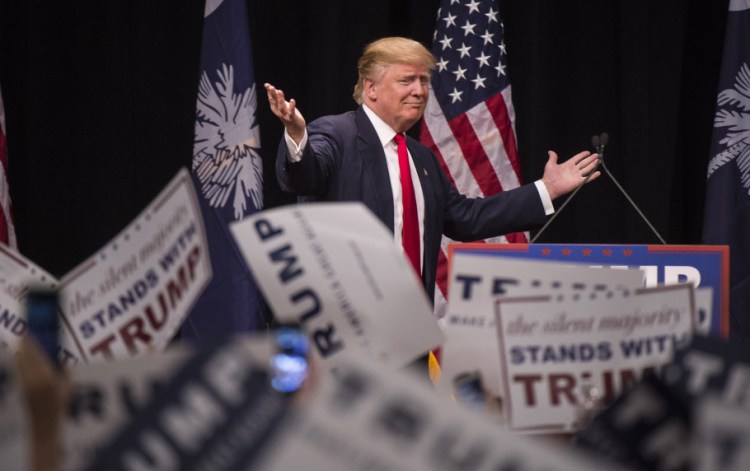CHARLESTON, S.C. — The strength of anti-establishment fervor in the 2016 presidential campaign faces a twin test Saturday, with Donald Trump favored to win the Republican primary in the crucial state of South Carolina and Sen. Bernie Sanders battling Hillary Clinton in the Democratic caucuses in Nevada.
Establishment Republicans have yet to fully coalesce around an alternative to Trump, though Sen. Marco Rubio of Florida, who stumbled in New Hampshire, hopes to rebound in Saturday’s balloting in South Carolina and cement himself in that role.
Clinton still enjoys strong support from the Democratic establishment, and her goal in Nevada is to blunt the momentum Sanders acquired from a victory in New Hampshire and then move on next week to South Carolina, where she enjoys broad support from African Americans.
A big Trump victory in the Palmetto State would stamp him clearly as the Republican front-runner, while a Sanders win in Nevada would raise more questions about Clinton’s appeal and add to pressure on her to score a big victory in South Carolina.
All polls in South Carolina show Trump leading, though they differ over the size of his margin ahead of the next two candidates, Sen. Ted Cruz of Texas and Rubio. In Nevada, where polls are scarcer, Sanders and Clinton appear to be in a dead heat. The Vermont senator has appealed to younger Hispanics to support his candidacy in an effort to counter claims that he cannot attract minority votes.
South Carolina’s Republican primary has a history of identifying the eventual nominee and often embracing the establishment’s choice of candidates. That pattern was broken four years ago when former House speaker Newt Gingrich handily defeated Mitt Romney. Trump threatens to do the same with a victory Saturday, which would further unsettle party regulars.
This weekend marks one of the few times when the Democratic and Republican calendars diverge. Republicans will hold caucuses in Nevada on Tuesday, while Democrats will have their primary in South Carolina on Feb. 27.
As the leading outsiders in the presidential race, Trump and Sanders continue to underscore frustrations with politics as usual on both the left and right. Trump has tapped anti-immigration sentiment in particular and has drawn energy from working-class white voters. Sanders has energized younger voters as part of a grass-roots constituency that has given his candidacy surprising strength.
“There is a shift in the establishment and thinking of Republicans in South Carolina from mainstream, center-right Republicans to angry, hard-right Republicans,” said Kaeton Dawson, a former South Carolina Republican Party chairman who is not aligned with any candidate. “It’s a monumental shift against the pillars of our society: our government and our elected officials.”
That reality has put establishment candidates on the defensive in South Carolina, and none more so than Jeb Bush. Bush could find his candidacy in jeopardy if he finishes poorly Saturday, as some polls suggest. Ohio Gov. John Kasich, is hoping for a finish just well enough to justify his focus on the Michigan primary.
The tone of the South Carolina campaign has been overwhelmingly negative as candidates have carried on an acrid dialogue in which the words “liar” and “lying” have been injected at a volume rarely seen even in a state known for brutal intraparty contests.
Send questions/comments to the editors.



Success. Please wait for the page to reload. If the page does not reload within 5 seconds, please refresh the page.
Enter your email and password to access comments.
Hi, to comment on stories you must . This profile is in addition to your subscription and website login.
Already have a commenting profile? .
Invalid username/password.
Please check your email to confirm and complete your registration.
Only subscribers are eligible to post comments. Please subscribe or login first for digital access. Here’s why.
Use the form below to reset your password. When you've submitted your account email, we will send an email with a reset code.